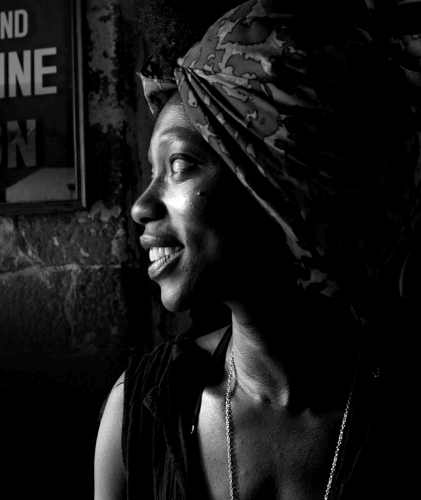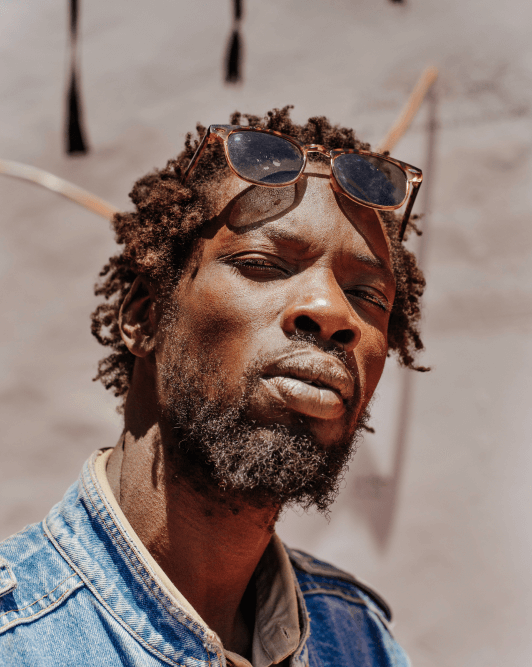Selly Raby Kane
The Selliest
Selly Raby Kane’s showroom and studio occupies a three-story building on a quiet street in the center of Dakar. It’s dusty season, when the harmattan wind from the Sahara fills the city with fine sand. Kane wears her updated take on the traditional “bou-bou”, star-shaped mirrored glasses and a silver sequin face mask. Not for protection against the elements, just as a matter of style.
Published 27/10/2020
CF
What do you say when people ask: “What do you do ?”
SRK
I talk about what takes most of my time, which would be fashion. And then what I aspire to do, which would be film, and the arts. Then you have design as a whole and different collaboration projects, like the development of Muus Du Tux, the collective of creatives that I share my space and thoughts with.
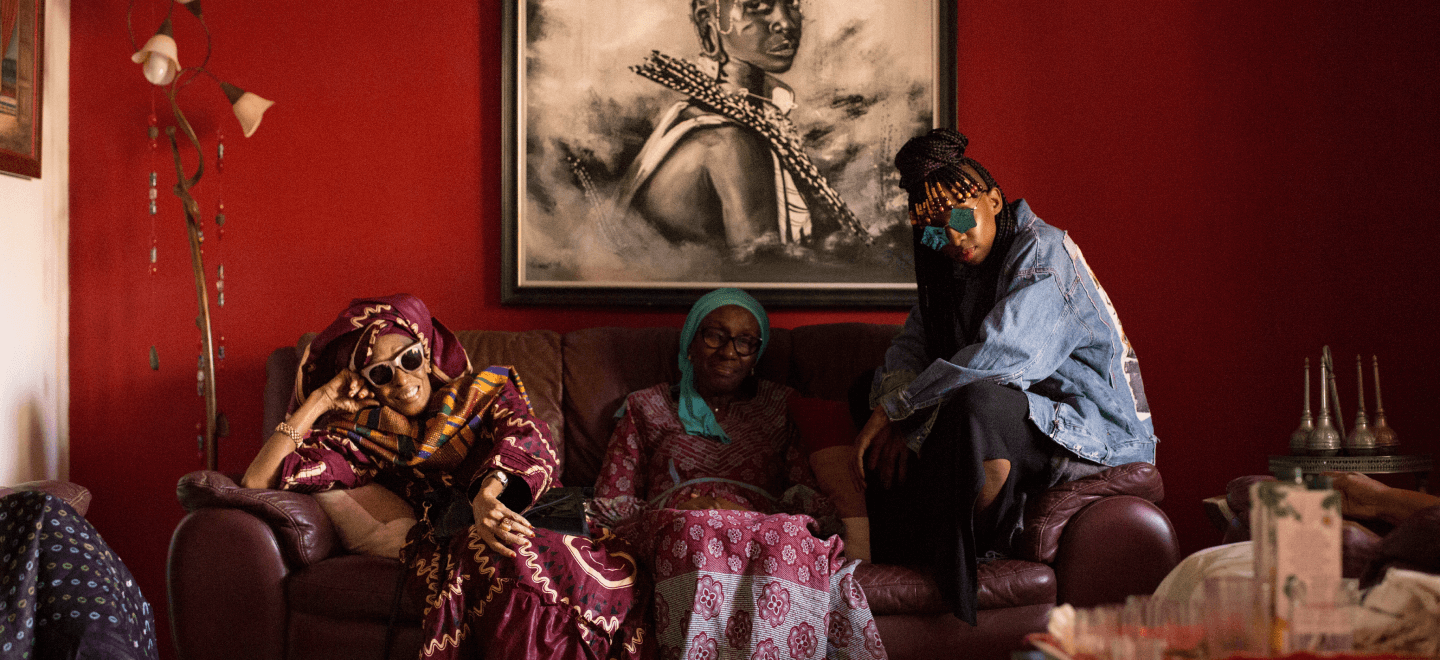
Three generations of Kane
«My grandmother has always been one of my biggest influences. At 80 years old she is still a fashion icon.»
CF
Are you comfortable with calling yourself an artist ?
SRK
Not yet. Maybe when I can dive further into film making, and have more opportunities to express myself without having to mind the day-to-day production of running a fashion brand – which requires a very commercial mindset. Maybe then I will feel at ease calling myself an artist!
Collaboration is important to Kane who views fashion as a force for change. She follow in the footsteps of late Senegalese artist Joe Ouakam and filmmaker Diop Mambéte, founders of Laboratoire Agit’Art, a disruptive and rebellious collective that started in the early 1970s. One of Kane’s recent collections, “17 Rue Jules Ferry”, was named after the location of Ouakam’s backyard in Downtown Dakar, where the artists would come together.
CF
Are there similarities between what Muus Du Tux are doing and what Oukam and Diop did in the 1970s ?
SRK
Absolutely. They formed a group of super creative individuals who broke boundaries and completely shifted the meaning of creating art in Senegal. They set fire to everything that had been put into the heads of artists back then. Showing the world that, for example, junk art was art, that formats needed to change, and that white galleries did not have a monopoly on art and beauty. Now, we are entering a new cycle. That’s how time works. This is our cycle, our fight. And we have tools that other generations didn’t have, not least new technologies.
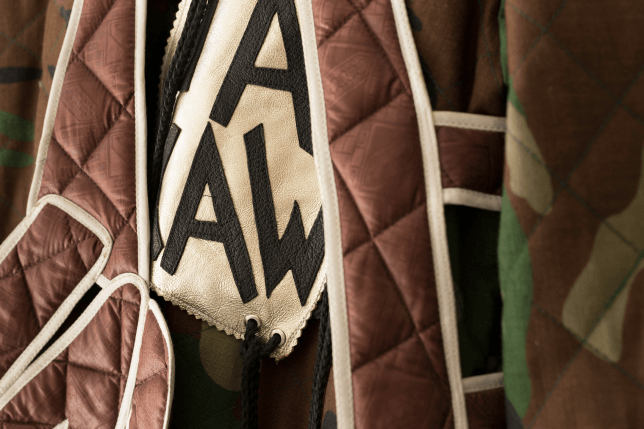
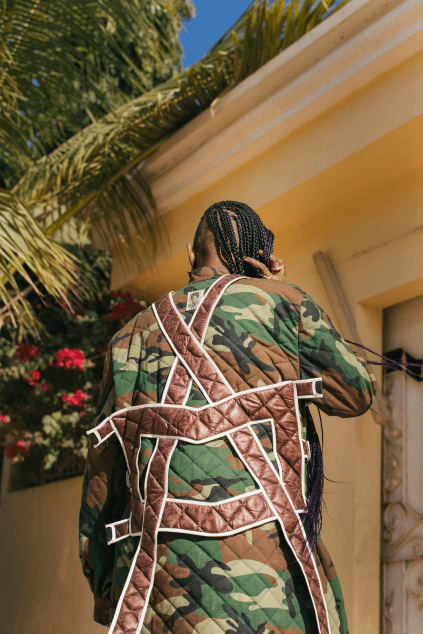
CF
Yesterday we sat down with your grandmother, mother and aunties, and you asked them about their fashion history for the first time ?
SRK
Yes! I guess it’s been too close to home. My grandmother has always been one of my biggest influences. At 80 years old she is still a fashion icon, always dressing up, with a different tailor for each silhouette. But yesterday I learned that all the women in my family were obsessed with fashion, and with maintaining their status and expressing themselves through their garments. I was interested to hear about the road we’ve traveled as Senegalese women, from the time they were young until today. For some time, they didn’t want to wear traditional clothing – that was the mindset here before independence. For me, it’s liberating to wear it. Our conversation made me think about how quickly change can happen, and that things are always in motion. If you can act as an accelerator, that’s great. Times will change anyhow, because that’s just how it works.
SRK
I started in fashion at a moment when my father was tired of his world, and had a choice to do whatever he wanted to. I also think, because his parents didn’t support his creative side, he wanted to support mine.

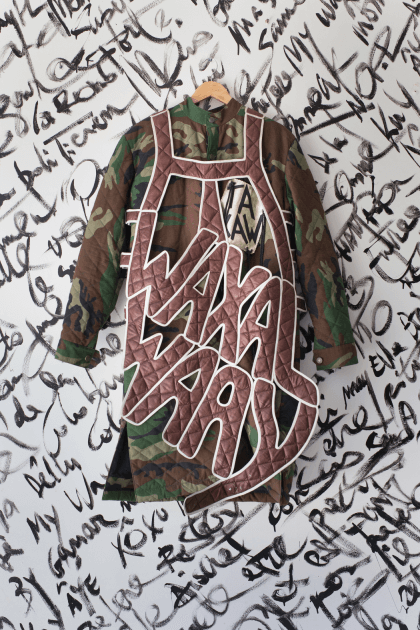
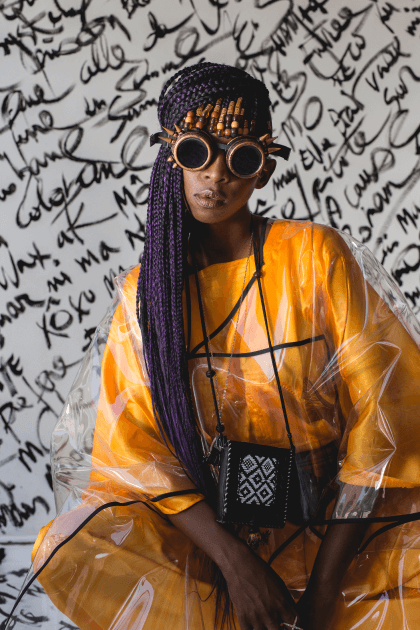
CF
In another universe, if his parents had been more like yours… ?
SRK
… he would have been a jazzman. Free jazz, playing the guitar and harmonica – for sure!
CF
In your late teens you chose to study political science in Dakar ? Why was that ?
SRK
Before I turned eight, I already knew I wanted to be a designer. I used to sow by hand, dressing dolls, always annoying the neighborhood tailors. Then, mostly by chance, I became a child rights activist. Between 8 and 17 I was hosting a radio show for kids, interviewing Kofi Annan and representing Senegal in the UN, stuff like that. At that age, having a voice, being able to express my opinion and knowing that people were listening to me, it was precious, and it impacted my choices.
«When I arrived in France in 2004, it was the first time I realized that there are differences amongst people.»
CF
Was it always your intention to become an independent entrepreneur ?
SRK
I always knew I would be on my own. And that I would need to know as much as possible about the industry – about sourcing and distribution – the business of creating products and making them available to many people. Mod Spé taught me about textile technology and industrial production, tools that I am still using today. But it was not primarily about academics for me. I came to Paris at the time of a cultural shift, when art and culture was exploding. It was a culture shock to me, which helped unlock something deep down inside. I was able to understand what my creative language was, rooted in the influences that I had absorbed during childhood in Dakar. It was already in me, but it didn’t show in my garments yet.
CF
Did you ever consider staying in Europe after graduation ?
SRK
I always knew that Dakar was where I could express myself and interact with people in peace. When I first arrived in France in 2004, it was the first time I realized that there are differences amongst people. One example: I was waiting to cross the street. There was a big lady next to me, her bag was on my side. She looked at me, took the bag and shifted it to the other side. I suddenly realized that to her, I was “the other”. I had never experienced anything like that before. So, I had to reflect – what can situations like these create inside of you? What can they imprint on your psyche? Did I want to live in a country where I had to deal with this every day? Was this where I saw myself thrive? No.


CF
How did you get started when you returned home ?
SRK
I was already part of Petit Pierre, a collective of creatives in Dakar. In 2013, we organized “Be Street,” a huge fashion show inspired by urban arts across Africa and globally. It was a massive immersive installation, mirroring urban scenes of Dakar in a surreal way. Street vendors mixed with dancers, shoe makers and poets, and a fashion show in the middle of that. We wanted to bring the magic of Dakar’s aesthetic and style into the future and see what would happen. It had a very different approach from what Senegalese fashion shows were back then, and gave us a lot of exposure.


SRK Showroom, interior and exterior

CF
You view the founder of the Petit Pierre Collective, Cheikha Loum, as your mentor ?
SRK
True, though he would never say he is anyone’s mentor! He was the one who gave me the idea of transferring the stories I used to write in my head, about my collections, into actual writing. And I became addicted to that. Working with my collections, I start out with a vague mood or direction, and write a story inspired by that. Once the narrative is written, sometimes with characters, dates and locations, it carries with it the intention of the collection. I translate that it into a huge mood board where I include as much as possible; words and images, so that people can know precisely what I am talking about. I only start drawing once the narrative is done. Also, working on the collections or fashion shows, I always collaborate with a beat maker, a producer, or just a musician who can translate the collection into a signature sound. In my personal creative process, I gravitate towards experimental music. It helps me connect with something deeper, it’s like an accelerator. I’d like to start making music actually. It could be interesting to create sound together with the garments, a story that blends many worlds.
Kane, like many of her peers in the new wave of African fashion designers, experiments with mixing international influences with traditional elements and silhouettes. Lately, she has learned to work with niahaas, the intricate patchwork technique used by the Baye Fall, a Sufi order that Kane likens to the urban tribes and subcultures she encountered in Europe, but with a spiritual base. The Baye Fall are known for their unique garments, the patchwork originally developed by sewing together salvaged or donated fabric scraps. The philosophy of these community based groups fits well with Kane’s own focus on social responsibility and sustainability, or as she has put it “opulence through frugality”.
SRK
Nothing has sparked my curiosity and app-roach to life and fashion as much as the Baye Falls. They are the only ones in Senegal who’ve historically challenged social codes, expressing individuality and freedom. And they dress in that exact spirit, with complex and creative ways of expressing their identities, their beliefs and ways of relating to eachother and society at large. The dress codes, the accessories, the readings and philosophy, everything that one connects to a subculture is pretty much there. You also have different factions of Baye Falls with different styles. The black and whites are not the same as the red and blacks etc. Most interesting to me is the Mouride brotherhood, founded by Amadou Bamba in the holy city of Touba. He was obviously an important spiritual figure and involved in the anti-colonial fight. But he also created this trend, a mindset and a style that contributes to the Mouride being the fastest growing brotherhood in Senegal today. I’m curious about that part of our heritage. The lifestyle, and the way of dressing are as important to document and draw inspiration from, as is other parts of our heritage. I have a very specific way to approach that, and that’s precious.
«As Senegalese youth, we are not waiting for the patrimony to arrive, or for others to decide what we are to do.»
CF
How do you go about “digging” into these archives ?
SRK
So far, I’m on a superficial level. I read a lot and study talismanic writings, and the art of healing in Senegal. I’m realizing that there is a misconception of modernity in my country.I think our politicians too often feel that modernity is looking and doing like Paris or Dubai. But it’s not that at all. African modernity is not about going to Dubai to buy all your furniture and bring it back here. It’s about looking at what we have, how it adapts to our time now, and keep what is useful in order to create a better environment and better lives for people. I don’t think we dig deep enough into our patrimony. It is happening in some layers of Dakar, but not in what’s actually being built, such as in houses, roads and infrastructure. That is unfortunate.
CF
Will the younger generation make it happen ?
SRK
Absolutely. How mainstream it is going to be remains to be seen; how people are going to shift their approach to what being cool is; what being rich is. It’s an ongoing conversation. As Senegalese youth, we are not waiting patiently for the patrimony to arrive, or for others to decide what we are to do.


CF
The debate surrounding heritage, patrimony and, for example, reclaiming of stolen art from the continent was fueled recently when the new Museum of Black Civilization opened in Dakar. Have you been ?
SRK
Yes, and it’s an important space. It was super moving to enter the main hall and see all the skulls and bones, millions of years old. And objects connected to our national icons, that we’ve only known from school books, like books, shoes, clothing and weapons … It made them seem more human, less legend, more touchable. The fact that objects are coming back is excellent. But what it will create inside of us is the most important thing. That discussion started long before the objects started to arrive. How can we use these objects to create and activate a conversation amongst people. I definitely don’t think that museums will be the only spaces where the patrimony will be used or stored.
SRK
We are using all tools available to us, from technology, scenography, sound immersion and VR. Anything that can reach deeper into human beings than policy and curricula can. I feel that the moment is here for a deep shift in people’s mindsets, and that arts, culture, and design is the way to make that shift happen. You can see and feel it happening here in Dakar and on the continent. One of our upcoming projects is Estrogen, a publication and a platform for radical creative women who want to be able to express themselves without having make concessions or adapt to anyone or anything. A space for abundance, for maximalism and radicality. In Senegal, if you think or act in a slightly different way, you can be labeled plain crazy. I hope Estrogen will open doors for a lot of crazy people.
CF
It seems important for you to open doors ?
SRK
A brilliant man, one of my elders, told me this: You don’t have to mobilize a huge group of people. You only need to open a door, through your work, your statements, your unique voice. Eventually, tomorrow or in a couple of years, it will become what it must become, when it’s time for people to enter that world, at their own pace. I think this is a time of reconnection, a time of pure appreciation of what we have and how it can bring us into the future. And once the door is open, it cannot be closed.
Published 27/10/2020
By Carmilla Floyd
Photo credits Petorovsky
